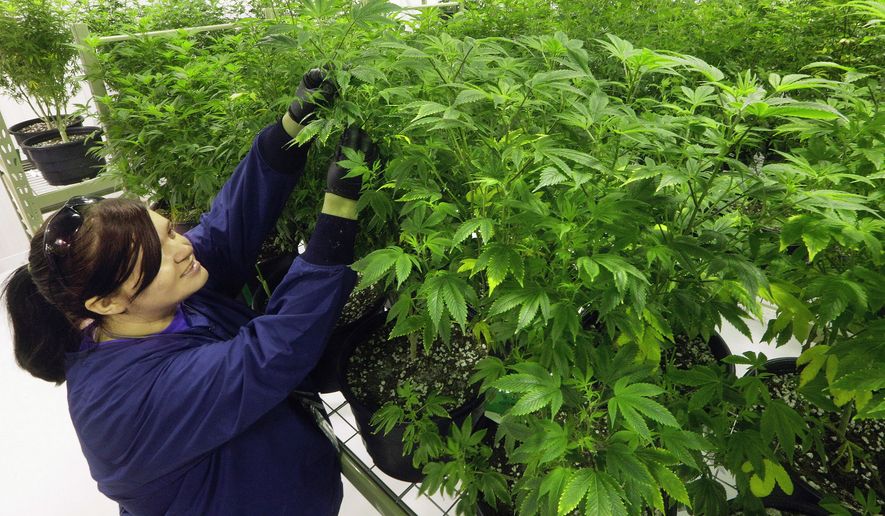Ashby Henderson used to grow vegetables for restaurants but says she has come out of the “weed closet” like scores of other D.C. women.
The co-founder of Women Grow D.C. said that in her first year as the group’s leader she has met more women who use, grow and advocate for marijuana than she ever knew existed.
“Before I started, I was the only person I knew who did marijuana,” said Ms. Henderson, slouching in her chair at Serendipity Jazz Coffeehouse in Northeast. “It’s becoming this not-scary thing anymore. It’s just a plant.”
With jurisdictions around the country legalizing pot for recreational and medicinal use, budding groups like Women Grow are rising to the forefront of what had been an illegal black market dominated by men.
The D.C. chapter of the national for-profit Women Grow started last May with 12 members. Now, several sponsors fund the organization and about 100 people attend its monthly networking and speaker meetings.
Though the meetings attract men and women in equal numbers, the programs are geared toward female users and growers, Ms. Henderson said.
“If you cater to a woman, she’s more likely to come to the event feeling safe in an uncomfortable kind of arena,” the former farmer said. “They don’t even have to talk about [cannabis]; they can just listen and learn.”
Ms. Henderson, who gave her age as “47 or 48,” once ran a produce farm in Riverdale, Maryland, that supplied vegetables for Rose’s Luxury restaurant, but she recently dedicated herself to the business of pot.
She is aiming to apply the business development techniques of the tech industry to her work with weed by opening an “accelerator” that would fund and mentor entrepreneurs with their cannabis innovations.
“Hopefully, it will help a lot of other people,” Ms. Henderson said. “I’d like to see [small businesses] get a good bit of a hold in this industry before it does go to corporate.”
Aside from her business aspirations, she plans bud-judging contests and charity auctions with her Women Grow co-chairwoman, Laila Makled.
Women Grow joins a number of D.C. groups that advocate for cannabis legalization and educate people about pot.
“[We’re] almost like rebranding cannabis,” Ms. Henderson said. “Taking away from the ’Reefer Madness’ days and bring it back to more of an herbal, healing, holistic option for people.”
D.C. voters overwhelming approved the use of recreational marijuana in 2014, and the initiative became law in February last year. Anyone 21 or older is allowed to possess up to 2 ounces of marijuana and grow as many as six plants in a private residence if no more than three of those plants are mature.
Public use of pot is banned under city law, as are the sale and distribution of the drug. But adults in the District can gift up to 1 ounce of marijuana to another city resident who is of age.
Pot possession remains a federal offense and can be prosecuted on any of the acres of federal property that comprise the nation’s capital.
Ms. Henderson said she hopes pot eventually will be removed from the federal Controlled Substances Act, where it is in the same category as heroin and Ecstasy, but Women Grow remains within the law and is transparent with all of its operations.
“We really have to comply with all the laws because I feel we are under scrutiny,” she said. “We are leaders, and we should do the right thing.”
As a matter of national policy, Women Grow does not participate in civil disobedience in its advocacy for marijuana legalization. The local chapter chose not to attend a demonstration on the White House steps last week that was orchestrated by the outspoken, male-led DC Marijuana Justice.
However, the women’s group participated as an education and networking center in the inaugural National Cannabis Festival, held Saturday at RFK Stadium.
“I feel like women are a little bit more reserved with pushing the envelope than men are,” Ms. Henderson said. “They’re less risk-taking. They want to make sure that they get it right, that they’re not going to break any laws or get in any trouble.”
Ms. Henderson said she hopes her organization will encourage more women to enter the pot industry and create a norm that appeals to men and women.
“The more women growers there are,” she said, “the more women growers there will be.”
• Faith E. Pinho can be reached at fpinho@washingtontimes.com.




Please read our comment policy before commenting.